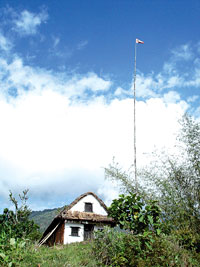|
|
| FORCED OUT: The owners of this house in Terathum were evicted by the Maoists and haven't yet returned. |
"We are tired of knocking on government doors, we have come to the UN so they can pressure the state to do something about us displaced people," says Putali Rokka, who left Rolpa with her husband and children eight years ago following Maoist threats.
Rokka is among 100 displaced people gathered in front of UN's Nepal human rights office (OHCHR) in Chauni on Monday. Many walked all morning to attend the rally hoping for help.
The government has offered help to return and in rehabilitation, but the refugees say that is not enough. They want security and their property returned.
Kalpana Bhandari, whose husband was killed by Maoists five years ago, wants to continue living in Kathmandu because she is scared the Maoists will come for her. "I often get threatening calls, they say they will cut off my fingers and legs. I know they will not spare me if I go back," she says. During last year's ceasefire, she had returned to her village in Ramechhap only to flee once again.
The murder of NC cadre Sushil Gyawali in Bardiya last week and of another activist by Maoists has deterred those who were thinking of going back. The displaced also want Rs 1 million in compensation, five percent representation in the government and interim parliament, and jobs.
Despite the ceasefire and a code of conduct, abduction, extortion and murder have continued. The OHCHR has expressed concern that local rebels do not always follow orders. The Maoists are still threatening to make returnees appear in their 'people's courts', and punish them before allowing them back.
"Who can dare to return when it is obvious that the killings haven't stopped?" asks Rokka.
Estimates vary, but there are said to be anywhere between 100-200,000 people displaced from their homes. Largely from rural communities, they have fled violence and economic hardship. The majority live with relatives in temporary accommodation, abandoned plots or in small rented rooms in Kathmandu. The maoist victims association (Maobadi Pidit Sangh) says there are at least 27,000 displaced people in the capital alone.
Living conditions are harsh and the refugees struggle for employment, lodgings, basic services like health and education. Most work as labourers, factory workers, security guards or house help. These jobs are insecure, so they end up surviving on loans.
"I have not paid the rent for the last four months," says Kul Bahadur Karki, who was abducted by the Maoists in Dolkaha, beaten and left to die, "I borrow from my neighbours when I can, otherwise I just eat what I find."
"There is never enough to eat," says Sita Pariyar, who fled Kailali when Maoists threatened her. Five other members of her family share a room in Dallu. "I have a ten-month-old daughter, a husband who suffers from lung problems, a father who can hardly see and a sister who cannot attend school because there is no money," Sita adds.
The human right's group, Insec, says it is the state's responsibility to take care of citizens. "It is only the government that can provide shelter, employment, education and other services," says Insec's Prekshya Ojha.
The royal regime did set up a national policy on the internally displaced, but no one else is talking about it. There isn't even an accurate figure on the number of people affected.
OHCHR's Bjorn Pettersson says: "According to international norms, integration for those who want to stay back in their current locations is as important as return and rehabilitation."



